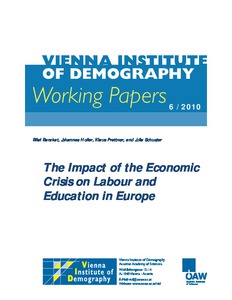The impact of the economic crisis on labour and education in Europe
"In summer 2007, the US subprime crisis emerged and economic growth in industrialised countries started to slow down. The situation deteriorated after the default of Lehman Brothers in September 2008 and despite massive government interventions, the United States and most European countries sli...
| Main Authors: | , , , , |
|---|---|
| Institution: | ETUI-European Trade Union Institute |
| Format: | TEXT |
| Language: | English |
| Published: |
Vienna
2010
Austrian Academy of Sciences |
| Subjects: | |
| Online Access: | https://www.labourline.org/KENTIKA-19184212124919024949-The-impact-of-the-economic-cri.htm |
| Summary: | "In summer 2007, the US subprime crisis emerged and economic growth in industrialised countries started to slow down. The situation deteriorated after the default of Lehman Brothers in September 2008 and despite massive government interventions, the United States and most European countries slid into recession. We investigate the influence of the recent economic and financial crisis on European labour market perspectives and educational attainment decisions. Furthermore we disentangle the differential impacts of the crisis on various demographic subgroups. We find that young male workers have been hit hardest, while older workers and women have been partially protected by non-redeemable contracts and the fact that they work in sectors which have been less severely hit by the crisis. Focusing on the education sector, it seems that the demand for education increases because individuals try to circumvent the tight labour market, while the supply of education suffers because of the increased pressures on federal budgets in most European countries. However, we conclude that it is too early to make a definite statement because the full impact of the crisis on the education sector is still to come." |
|---|---|
| Physical Description: | 14 p. Digital |

